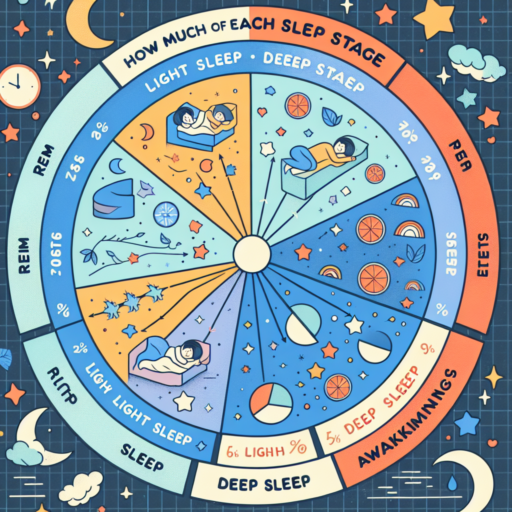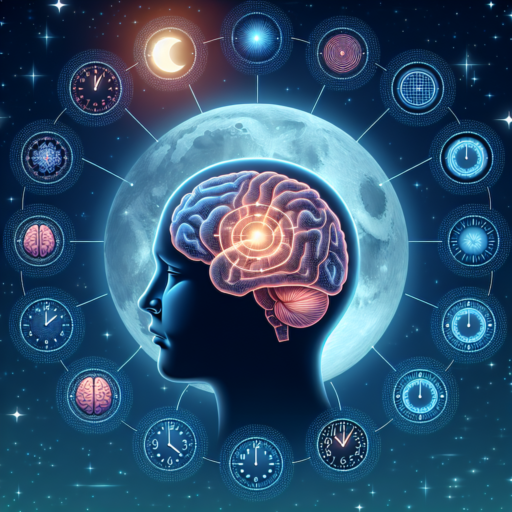Understanding the Different Stages of Sleep
Understanding the intricate process our bodies and minds undergo during sleep is fascinating. Sleep is divided into several stages, each playing a crucial role in maintaining our overall health and well-being. It moves through a cycle that repeats several times throughout the night, consisting of both Non-REM and REM phases. Recognizing these stages can greatly enhance our comprehension of sleep patterns and their impacts on our daily lives.
The Non-REM Stages
The first part of the sleep cycle is known as Non-REM (Rapid Eye Movement) sleep, which is subdivided into three distinct stages. The first stage is the transition from wakefulness to sleep and is marked by light sleep where one can be easily awakened. The second stage is when the body begins to prepare for deep sleep, characterized by a decrease in heart rate and body temperature. The third stage of Non-REM sleep is the deep sleep phase, essential for physical recovery, memory consolidation, and hormonal regulation.
The REM Stage
Following the Non-REM stages, the sleep cycle progresses to the REM phase, which is most associated with vivid dreams. During REM sleep, brain activity ramps up, closely mirroring that of being awake. This stage is crucial for cognitive functions such as memory, learning, and creativity. Interestingly, the REM stage becomes progressively longer with each cycle, ensuring that the latter half of sleep is rich in this critical phase. This pattern highlights the importance of a full night’s sleep for cognitive and emotional health.
What is the Best Sleep Stage for Superior Rest?
Understanding the best sleep stage for superior rest involves delving into the intricacies of the human sleep cycle, which is divided into non-REM and REM stages. Each stage plays a crucial role in ensuring that we wake up feeling refreshed and rejuvenated. However, one stage stands out when it comes to deep, restorative sleep.
The Significance of Deep Sleep (NREM Stage 3)
Deep sleep, or NREM (Non-Rapid Eye Movement) Stage 3, is often considered the pinnacle of restorative sleep. During this stage, your body undergoes significant recovery processes—including muscle repair, memory consolidation, and the release of growth hormones. It is in this profound silence of the mind and body that the magic of superior rest unfolds. Deep sleep’s ability to reenergize the body and fortify the immune system makes it a critical component of a healthy sleep cycle.
The quality of deep sleep can often be a more accurate indicator of restfulness than the quantity of sleep. Achieving a sufficient duration of deep sleep ensures that both mind and body are adequately restored. It’s during this stage that the brain filters and processes the day’s experiences, converting short-term memories into long-term ones and fortifying our learning and memory capabilities.
Maximizing Deep Sleep
To enhance the quality of deep sleep, establishing a consistent sleep routine and creating an environment conducive to rest are key. Minimize exposure to blue light from screens before bedtime, indulge in relaxing activities, and ensure your sleeping environment is cool, dark, and quiet. By prioritizing deep sleep, you lay the foundation for superior rest and, by extension, improved overall health and well-being.
Embarking on a journey to improve deep sleep is a step towards experiencing the pinnacle of restorative rest. While all sleep stages are important, deep sleep is the golden thread weaving through the tapestry of a restful night, offering unparalleled benefits for mind and body rejuvenation.
How Deep Sleep Differs from Other Sleep Stages
Deep sleep, also known as slow-wave sleep, is the third stage in the sleep cycle and markedly different from the other stages of sleep such as the lighter NREM (non-REM) stages and the REM (rapid eye movement) stage. Understanding the unique characteristics of deep sleep helps in recognizing its critical role in our overall health and well-being.
The Distinctive Characteristics of Deep Sleep
One of the most defining features of deep sleep is the significant decrease in bodily activity. Heart rate, breathing rate, and brain activity slow to their lowest levels during sleep, making this stage the most restorative phase. Unlike in REM sleep where brain activity picks up to levels seen when awake, deep sleep allows for the brain to have a break, facilitating memory consolidation and the processing of the day’s information. This phase is crucial for physical recovery, tissue repair, and growth hormone release, underscoring its importance in physical health.
Comparing With Other Sleep Stages
In contrast to the deep, restorative sleep, the other stages of sleep, including the lighter NREM stages and the REM stage, serve different but equally crucial functions. NREM sleep, which precedes deep sleep, acts as a transition period from wakefulness to deep sleep and is characterized by a reduction in sensory awareness and bodily movements. However, it lacks the profound brain and body slowing seen in deep sleep. Meanwhile, REM sleep, known for being the dream stage, involves increased brain activity and is vital for emotional regulation and memory. Despite its importance, REM does not offer the same physical recuperative benefits that deep sleep does.
Understanding how deep sleep differs from other stages highlights its irreplaceable role in our sleep cycle. While each stage of sleep has unique functions and benefits, deep sleep stands out for its profound restorative effects on the brain and body.
No se han encontrado productos.
The Importance of REM Sleep: Why It’s Crucial for Your Mind
Understanding the critical role of REM (Rapid Eye Movement) sleep is vital for appreciating how our brains and bodies function optimally. As the most profound phase of the sleep cycle, REM sleep is when most of our dreaming occurs. This stage is not just about vivid dreams; it’s fundamentally crucial for various aspects of cognitive and emotional health. During REM sleep, the brain is almost as active as it is while awake, playing a significant role in memory consolidation, learning, and emotional regulation.
Memory Consolidation and Learning
Diving deeper into the significance of REM sleep reveals its essential role in memory consolidation and learning. Studies have shown that during REM sleep, the brain systematically processes and integrates the information acquired during the day. This mechanism not only helps in solidifying memories but also in linking new knowledge with existing information, thus enhancing learning and problem-solving abilities. In essence, skipping on REM sleep might not just leave you feeling groggy but can impair your ability to remember and learn new information.
Emotional and Mental Health
The impact of REM sleep extends beyond cognitive functions and plays a pivotal role in emotional regulation and mental health. By processing emotional experiences during REM sleep, our brain helps us navigate feelings and reactions in a more balanced manner. Lack of sufficient REM sleep has been linked to various mental health issues, including depression and anxiety. Moreover, REM sleep allows for the processing of stressful experiences, providing a form of overnight therapy, which is crucial for maintaining mental health and emotional resilience.
Maximizing Your Sleep Quality: Tips for Reaching the Best Sleep Stage
Many underestimate the importance of reaching the optimal sleep stage for maximizing sleep quality. The body cycles through various sleep stages each night, but it’s the deep REM (Rapid Eye Movement) stage that is most restorative and essential for mental and physical health. Achieving longer periods in this stage can significantly influence your overall well-being.
Establish a Regular Sleep Schedule
One of the most effective methods to enhance your sleep quality is by maintaining a consistent sleep schedule. Going to bed and waking up at the same time every day helps regulate your body’s internal clock, making it easier to fall asleep and wake up naturally. This consistency directly impacts the amount and quality of REM sleep you achieve, as it allows your body to enter the deeper stages of sleep more easily and for longer durations.
Optimize Your Sleep Environment
Creating a sleep-conducive environment is crucial for maximizing REM sleep. This includes ensuring that your bedroom is dark, cool, and quiet. Investing in a comfortable mattress and pillows can also make a significant difference. Additionally, consider using white noise machines or blackout curtains to block out disruptive sounds and light, both of which can interfere with the progression into deeper sleep stages.
- Keep electronics out of the bedroom to reduce blue light exposure
- Avoid caffeine and heavy meals before bedtime
- Establish a pre-sleep routine to signal to your body that it’s time to wind down
Exploring the Benefits of Light and Deep Sleep Phases
Understanding the intricacies of sleep reveals the pivotal role played by its different stages, particularly light and deep sleep phases. Each stage of sleep not only contributes to our overall well-being but also serves distinct benefits critical for daily functioning and long-term health.
Enhancing Learning and Memory
One of the most profound benefits of the deep sleep phase lies in its ability to facilitate learning and memory consolidation. During deep sleep, our brain goes through a process known as synaptic pruning, removing unnecessary neural connections and strengthening the important ones, making it easier for us to learn and retain new information. The light sleep phase, conversely, serves as a transition period that prepares the brain for the deep sleep that is crucial for memory consolidation.
Boosting Immune Function
Our body’s immune system also significantly benefits from both light and deep sleep. While asleep, the body increases the production of proteins known as cytokines, which help the body fight off infections and inflammation. This boost in immune function during the sleep cycle illustrates how critical a balanced diet of light and deep sleep is for maintaining health and fighting diseases.
Regulating Emotions and Stress
Last but not least, the right balance of light and deep sleep phases is vital for emotional and psychological well-being. Deep sleep helps to regulate the hormones responsible for stress and emotions, including cortisol and adrenaline. On the flip side, the light sleep phase helps our brain smoothly transition into the deep sleep necessary for emotional regulation. This intricate dance between light and deep sleep ensures we wake up refreshed and ready to handle the day’s emotional challenges.
The Science Behind Sleep Cycles: How to Achieve the Best Sleep Stage
Understanding the science behind sleep cycles is pivotal for enhancing the quality of our rest. Our bodies go through multiple stages during sleep, each contributing to the rejuvenation and repair essential for our well-being. These cycles include light sleep, deep sleep, and the Rapid Eye Movement (REM) phase, with each playing a crucial role in our physical and mental health.
Deep sleep, often referred to as the regenerative stage, is when the body repairs itself, builds bone and muscle, and strengthens the immune system. Achieving optimal deep sleep is crucial for feeling rested and energized. Strategies to enhance deep sleep include maintaining a consistent sleep schedule, creating a sleep-conducive environment, and managing stress levels. Regular exercise and avoiding caffeine and electronics before bedtime can also significantly improve sleep quality.
The REM stage, on the other hand, is vital for cognitive functions such as memory, learning, and emotional regulation. Dreaming occurs during REM sleep, and it is characterized by increased brain activity. To maximize REM sleep, experts recommend limiting alcohol consumption, as it can disrupt this stage, and ensuring adequate overall sleep duration, as REM periods become longer and more frequent towards the morning.
Last but not least, light sleep serves as a transition period between deep sleep and REM stages. It’s during these periods that the body prepares to enter the more restorative phases. While less discussed, optimizing light sleep is also essential, which can be done by adhering to a regular sleep-wake cycle and utilizing relaxation techniques before bed to improve sleep onset and quality. Completing multiple cycles of these stages throughout the night is key in awakening feeling truly refreshed. Thus, understanding and respecting the science of sleep cycles can guide us to achieve that coveted perfect night’s sleep.
Common Myths About the Best Sleep Stage Debunked
Sleep myths often misinform or confuse people about the true nature of our nighttime rest. One common misconception is the overemphasis on a particular sleep stage as the «best» or most beneficial for health. While it’s true that all sleep stages are important, misconceptions persist about the superiority of one over others.
Deep Sleep Versus REM Sleep: A prevalent myth is that one must aim for more deep sleep to wake up feeling rested. However, both deep sleep and REM (Rapid Eye Movement) sleep serve critical functions. Deep sleep is crucial for physical restoration, while REM sleep supports mental health and memory consolidation. Debunking this myth underscores the importance of a balanced sleep cycle rather than chasing a specific stage.
The Myth of Quantity Over Quality: Another common misunderstanding is the fixation on the amount of sleep, particularly deep sleep, rather than its quality. It is not merely about the duration but the quality and the cycle consistency that contribute to feeling refreshed. High-quality sleep involves cycling through all stages, including light sleep, which plays a significant role in transitioning between cycles and promoting overall sleep quality.
Optimizing Your Sleep Schedule: Strategies for Healthier Sleep Patterns
Certainly! Below is an example content section focusing solely on optimizing sleep schedules, formatted with SEO in mind.
Creating a healthier sleep pattern is vital for both mental and physical well-being. With today’s fast-paced lifestyle, it’s becoming increasingly challenging for many to find a balance that promotes a restorative night’s sleep. Optimal sleep hygiene practices can lead to improved productivity, mood, and overall health. Below, we delve into several strategies aimed at optimizing your sleep schedule.
Establishing a Consistent Sleep Routine
Maintaining a consistent sleep schedule is crucial for setting your body’s internal clock. Going to bed and waking up at the same time every day, even on weekends, helps regulate your body’s circadian rhythm. This consistency aids in falling asleep faster and experiencing deeper, more restful sleep cycles. The importance of a regular schedule cannot be overstressed when aiming for healthier sleep patterns.
Leveraging Light Exposure
Light plays a significant role in regulating our sleep-wake cycle. Exposure to natural sunlight during the day helps maintain a healthy circadian rhythm. Conversely, limiting exposure to blue light emitted by screens at night is equally important. This can be achieved by minimizing the use of devices such as smartphones and computers at least an hour before bed. Both of these practices are pivotal in optimizing your sleep schedule for better health outcomes.
Incorporating these techniques into your daily routine can significantly impact your ability to achieve a rejuvenating sleep experience. Embracing a consistent bedtime, limiting exposure to light before sleep, and understanding the role of your circadian rhythm are all foundational steps towards cultivating a healthier sleep pattern. By prioritizing these strategies, you are setting the stage for more energetic mornings and productive days.
The Role of Sleep Hygiene in Reaching the Optimal Sleep Stage
Understanding the pivotal role of sleep hygiene is essential for anyone aiming to reach the optimal sleep stage consistently. Sleep hygiene refers to the set of habits and practices that are conducive to sleeping well on a regular basis. Achieving deep, restorative sleep stages such as NREM (Non-Rapid Eye Movement) Stage 3, also known as slow-wave sleep, and REM (Rapid Eye Movement) sleep, is greatly influenced by how we prepare our bodies and minds before bedtime.
To initiate the journey towards improved sleep quality, it’s crucial to evaluate and adjust our pre-sleep routines. Factors such as the consistency of your sleep schedule, the environment you sleep in, and the activities you engage in before bed can significantly affect how quickly and smoothly you transition through the various stages of sleep. Strategies such as reducing exposure to blue light from screens, ensuring your sleeping environment is cool and dark, and establishing a relaxing pre-bedtime ritual can dramatically enhance your ability to fall asleep and progress into the deeper, more restorative stages of sleep.
Moreover, the avoidance of stimulants like caffeine and nicotine close to bedtime plays a crucial role in achieving the optimal sleep stage. Stimulants can interfere with the natural sleep-wake cycle, making it harder to fall asleep and move through the sleep stages effectively. Integrating relaxation techniques, such as deep breathing exercises, meditation, or reading, can also help in preparing the body and mind for a night of deep sleep. By prioritizing sleep hygiene, you set the stage for nighttime rejuvenation, enabling both body and mind to recover and function at their best.




